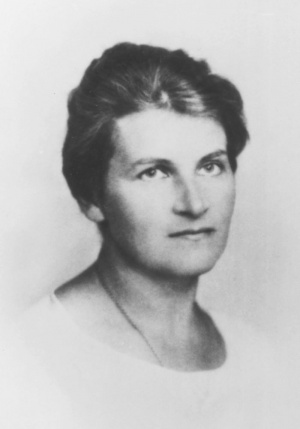Klassen, Mary Brieger (1891-1976)
Maria "Mary" Martha Brieger Klassen: born on 7 June 1891 in Riga, Latvia to Louis Christopher Brieger (1852-1910) and Clara Gertrude (Goeschel) Brieger (1862-1917). She was the middle child between two sisters, Erika and Irmgard. On 22 May 1915 Mary married Jakob J. Reimer (1891-1937) in Riga. They had one son, Harold. On 11 September 1926 Mary married Cornelius Franz "C. F." Klassen (1894-1954). They had four children: Walfried, Herbert, Justina (died in childhood), and Irmgard. In 1971 a debilitating stroke severely curtailed Mary's abilities. Mary died five years later at Menno Hospital (Abbotsford) on 6 December 1976 at the age of 85.
Mary was confirmed as a young woman in the German Lutheran church in Riga on 31 May 1909. On 22 May 1915 she married Jakob J. Reimer (1891-1937), whom she met in Riga. Jakob, a Russian Mennonite from Karassan, Crimea, was an electrical engineer trained at the Thüringer Institute (Ilmenau, Germany) and working in Riga at the time. During World War I, as the German army advanced, the couple moved to St. Petersburg, Russia. Mary worked as an accountant (Malcolm and Sons) and Jakob as an engineer (Mantel and Co.).
Eventually, the couple became part of a small Mennonite community in Moscow trying to find a way to maintain their Mennonite faith and values during the upheaval of the Russian Revolution and civil war. Mary worked as a secretary to Alvin Miller, director of the American Mennonite Relief (AMR) office in Moscow, and Jakob worked at several alternative service assignments during wartime (e.g., ambulance train medic and driving instructor for the Red Cross) and as an engineer after the war. A son, Harold, was born to them in 1923. In 1925 the couple divorced.
In 1926 Mary married Cornelius Franz "C. F." Klassen. Klassen was working with the Allrussischer Mennonitischer Landwirtschaftlicher Verein (AMLV) or Agricultural Union, which also had an office in the same building housing the AMR office where Mary worked. The Agriculture Union’s mandate was to negotiate with the Bolshevik government a way to reconstruct Mennonite agricultural life within the new communist reality (1923-1928).
After the Bolshevik government closed the AMLV in 1928, Mary and Cornelius were able to secure exit visas for their family, which now included another son, Walfried. They, along with some 21,000 other émigrés, felt the prospects of maintaining their Mennonite way of life and values in the new Bolshevik society were swiftly becoming untenable. On 30 November 1928, Mary, Cornelius, and their boys left Liverpool on the Canadian Pacific Railway (CPR) steam ship, Duchess of Atholl, arriving in St. John, New Brunswick, Canada, on 8 December 1928.
Mary and Cornelius and their family joined several of Cornelius’s siblings and their families already living in Winnipeg, Manitoba. Mary helped Cornelius in his new role collecting the travel debt owed by the Canadian Mennonite Board of Colonization to the Canadian Pacific Railway (approximately two million dollars). Full repayment was completed in 1946.
On 4 August 1935 Mary was baptized in the Assiniboine River. Minister C. N. Hiebert officiated at the baptism and Minister Jakob Epp gave the message. That evening both Cornelius and Mary were welcomed as members of Winnipeg’s North End Mennonite Brethren Church, Cornelius by transfer and Mary by baptism.
In 1948 the family moved to Abbotsford, British Columbia. From 1945 to 1954, Cornelius traveled back and forth from Europe to Canada helping to organize passage of Russian Mennonites out of Europe to North and South America. He died unexpectedly in 1954 while on assignment in Europe.
Mary was best known for her courage, sense of humor, resourcefulness, and trust in God’s faithful provision. According to her biographer, Maureen Klassen, "For some, Mary was the woman who had stood tall beside her husband in his role as respected leader of his people. To others, she was the woman who was always there behind this great figure in the Mennonite story. For her children, she was all too often the woman who was left behind without him, to take care of the family as he responded to the demanding challenges of his responsibilities with various Mennonite organizations."
Bibliography
Klassen, Herb and Maureen Klassen. Ambassador to His People: C. F. Klassen and the Russian Mennonite Refugees. Winnipeg, MB: Kindred Productions, 1990. Available in full electronic text at: https://archive.org/details/AmbassadorToHisPeopleOCRopt1.
Klassen, Maureen. It Happened in Moscow: A Memoir of Discovery. Winnipeg, MB: Kindred Productions, 2013.
Archival Records
Centre for Mennonite Brethren Studies, Winnipeg, MB: Mary Brieger Klassen family fonds (Vol. 1000, File #34).
| Author(s) | Jon Isaak |
|---|---|
| Date Published | April 2013 |
Cite This Article
MLA style
Isaak, Jon. "Klassen, Mary Brieger (1891-1976)." Global Anabaptist Mennonite Encyclopedia Online. April 2013. Web. 12 Feb 2026. https://gameo.org/index.php?title=Klassen,_Mary_Brieger_(1891-1976)&oldid=168319.
APA style
Isaak, Jon. (April 2013). Klassen, Mary Brieger (1891-1976). Global Anabaptist Mennonite Encyclopedia Online. Retrieved 12 February 2026, from https://gameo.org/index.php?title=Klassen,_Mary_Brieger_(1891-1976)&oldid=168319.
©1996-2026 by the Global Anabaptist Mennonite Encyclopedia Online. All rights reserved.
